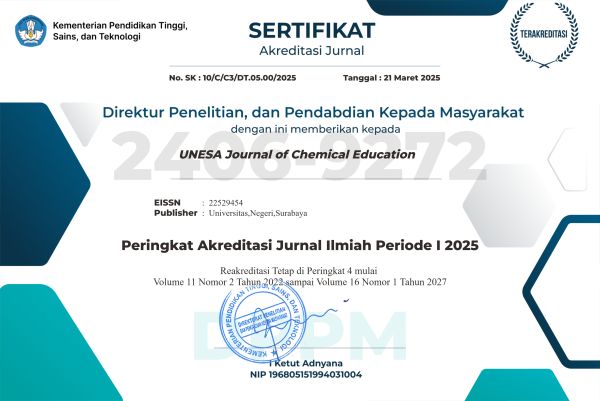DOI:
https://doi.org/10.26740/ujced.v8n2.p%25pAbstract
This study aimed to evaluate the learning of reaction rate materials with nested curricular arrangement which designed and implemented using inquiry models. The research subjects were 36 students of 10th grade of MIA 4 in Senior High School 1 Manyar, Gresik. Learning evaluation was based on two variables which were the skill improvement and student learning outcome. This study followed a quasi-experimental research design with one group pretest and posttest design. Analysis of skill improvement and student learning outcomes using the t-test. The research instruments were learning implementation sheets, observation of student activities, critical thinking skills test and learning outcomes test. The learning implementation in the first and second meetings obtained 4 rates, categorized as good according to the lesson plan. The students relevant activities during the learning process in the first meeting amounted to 94.63% and in the second meeting was 95.23%. Most students had learned well because of the high percentage implementation level. Critical thinking skills which were trained included focusing questions, considering the information source credibility, inducing and considering the results of the induction, observing and considering the results of observations. Critical thinking skill and student learning outcomes had significant improvement that is proved by T-test with the aid of SPSS, this shows that the value of t arithmetic more than t statistics table. According to the result, it is known that nested curricular arrangement assisted web enhanced course could develop the critical thinking skill and the student learning outcomes.
Keywords: Nested, Web Enhanced Course, Critical Thinking Skills, Inquiry.Downloads
Downloads
Published
Issue
Section
License
The license terms of the Creative Commons Attribution-NonCommercial 4.0 International (CC BY-NC 4.0) requires attribution to the original creator, permits non-commercial use, and does not allow for the application of legal or technological restrictions on others' use.
 Abstract views: 18
,
Abstract views: 18
, PDF Downloads: 63
PDF Downloads: 63













